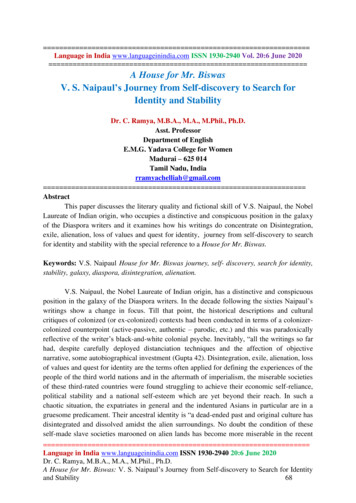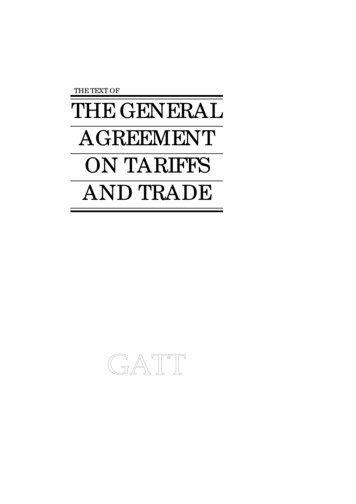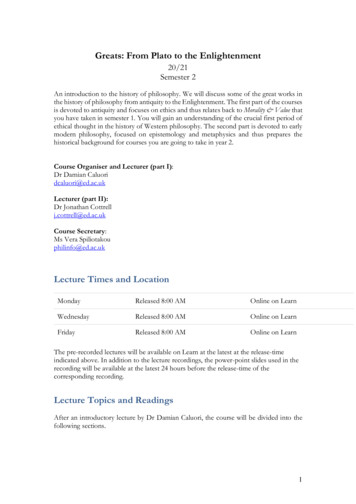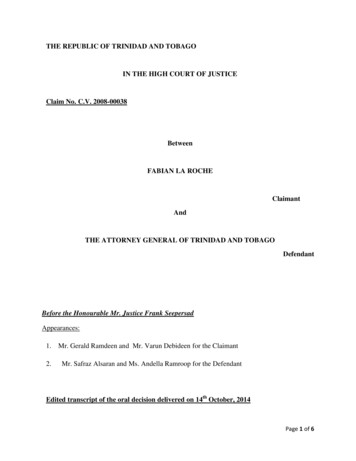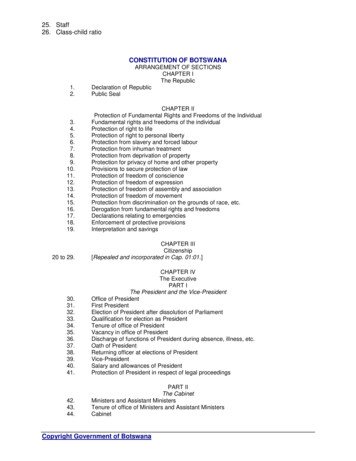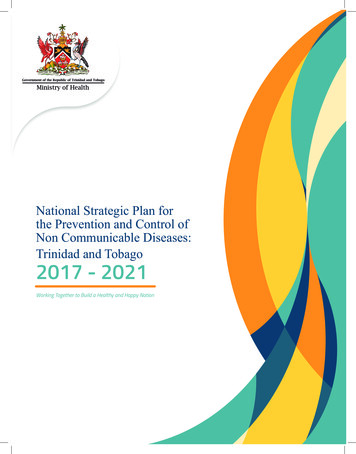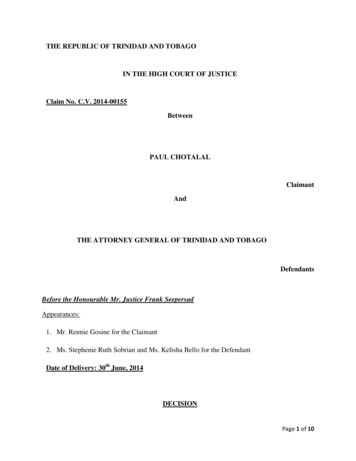
Transcription
THE REPUBLIC OF TRINIDAD AND TOBAGOIN THE HIGH COURT OF JUSTICEClaim No. C.V. 2014-00155BetweenPAUL CHOTALALClaimantAndTHE ATTORNEY GENERAL OF TRINIDAD AND TOBAGODefendantsBefore the Honourable Mr. Justice Frank SeepersadAppearances:1. Mr. Rennie Gosine for the Claimant2. Ms. Stephenie Ruth Sobrian and Ms. Kelisha Bello for the DefendantDate of Delivery: 30th June, 2014DECISIONPage 1 of 10
1. Before the Court is the Defendant’s Notice of Application filed on the 10th March 2014in which the Defendant seeks the following reliefs:“a. That paragraphs 5, 7, 9, 10, 11, 13, 14, 17, 18 and the first two lines ofparagraph 8 from the words, “At the Penal Police Station, the Claimant wasplaced in a cell. The Claimant was falsely imprisoned for a period of aboutfifteen (15) hours.” of the Statement of Case of the Claimant, filed on 16thJanuary, 2014 be struck out in its entirety pursuant to Rules 26.1(1)(1), Rule26.2.(1) (a), Rule 26.2.1. (b) and Rule 56.7 of the Civil Proceedings Rules1998 (‘the CPR’);b. The Claimant’s claims for damages for assault, false arrest and falseimprisonment be struck out pursuant to Rule 26.1 (k), (l) and (w) of the CPR;c. The Claimant’s claims for constitutional relief be struck out pursuant to Rule26.2.1 (b) and Rule 56.7 of the CPR and the claim for damages for maliciousprosecution be extended pursuant to Part 10.3 of the CPR; andd. The costs of the matter be paid by the Claimant to the Defendant, to beassessed in default of agreement.”2. The issues to be determined are:i.Whether the Claimant’s claims for damages for assault, false arrest andfalse imprisonment have been instituted after the expiration of thelimitation period pursuant to section 3(1) a of the Limitation of CertainActions Act Chp. 7:09ii. Whether the said claims should be struck out pursuant to section 26.1(k),(l) and (w) of the Civil Proceedings Rules (1998) as amended.Page 2 of 10
iii. Whether the Claimant’s claims for constitutional relief should be struckout.iv. Whether paragraphs 5, 7, 9, 10, 11, 13, 14, 17, 18 and the first two lines ofparagraph 8 from the words, “At the Penal Police Station, the Claimantwas placed in a cell. The Claimant was falsely imprisoned for a period ofabout fifteen (15) hours.” of the Statement of Case should be struck out.Determination of issues (i) and (ii)3. The Defendant relied on section 3 (1) a of the Limitations of Certain Actions Act Chp. 7:09and submitted that the Claimant’s claims as outlined at reliefs (a) and (c) of his Statementof Claim are statue barred and should be struck out.4. In his submissions filed on the 29th May 2014, Counsel for the Claimant conceded that theaforementioned claims became statue barred as at the 11th November 2011. Accordinglythe Claimant’s claims for damages with respect to false arrest, battery and falseimprisonment are hereby struck out.Issue iii5. The Defendant submitted that the Claimant’s claims in relation to the declaratory reliefssought were not made in the proper form and that the requirements laid out at Rule 56.7of the CPR had not been met. Counsel for the Defendant referred to the Court to thedecision of the Board of the Privy Council in Antonio Webster v. The Attorney General ofTrinidad and Tobago (2011) UKPC 22, and submitted that the Claimant’s claims forconstitutional relief ought to have been instituted by way of a fixed date claim form.Page 3 of 10
6. The Court was also asked to consider the decision of the Board in Thakur Persad Jaroo v.The Attorney General of Trinidad and Tobago (2002) UKPC 5 where the Board noted atparagraphs 2 as follows:“The Appellant’s case for the return of his vehicle was capable of being dealtwith relatively simply in the ordinary courts in Trinidad and Tobago by means ofprocesses which were available to him under the common law. It has beencomplicated by the fact that he chose to apply instead by way of an originatingmotion under section 14 of the Constitution of the Republic of Trinidad andTobago 1976 to the High Court. The question whether it was appropriate for himto assert his constitutional rights in a case of this kind lies at the heart of thisappeal.”7. In Thakur Persad Jaroo the Board upheld the conclusion of the Court of Appeal that themotion under s. 14(1) of the Constitution was an abuse of process because theappropriate claim was an action at common law. At paragraph 29 of the judgment theBoard stated:“The right to apply to the High Court which s.14 (1) of the Constitution providesshould be exercised only in exceptional circumstances where there is a parallelremedy.”8. In Antonio Webster (supra) at paragraph 20 the Board stated:“20. In the present case – and irrespective of the erroneous procedure which headopted – the Appellant, by his attorney, made two decisions about how toformulate his claim: one of them was right and the other was wrong. The rightdecision was primarily to formulate his claim, unlike the claim in Ramanoop, asbeing for damages in tort. The wrong decision was to include subsidiary claimsfor the three declarations: for they were redundant. Upon the filing of the Defencethen, even on the assumption, in the Appellant’s favour, that he had hitherto beenunaware of its likely content, it should have become even more obvious to himPage 4 of 10
that the declarations had been wrongly included and that he should apply forpermission to amend his claim form and his statement of case so as to deletethem. Instead, once Pemberton J. had resolved to determine, as a preliminaryissue, whether they had rightly been included, he argued in the affirmative; andindeed he appealed against her negative conclusion. Even at that stage, however,his then advocate came close to recognizing the folly of the appeal. For, in hiswritten submissions to the Court of Appeal, he wrote:“It is noteworthy that the Appellant sought no damages for the breach ofhis constitutional right but same is pleaded in his grounds for exemplarydamages The Court can therefore articulate and make a finding that theAppellant’s constitutional rights were violated and factor this into theaward of exemplary Common Law damages. This cannot however bedone in the absence of a declaration or finding that his constitutional rightswere breached.” (Italics supplied)The advocate was correct to submit that, were the Appellant to secure an award ofexemplary damages reflective of breaches of his constitutional rights, theAppellant needed a finding that they had been broken. But the advocate was alsocorrect to submit that a declaration to such effect would be alternative to such afinding and that there would be no additional need for it.”9. Having regard to the authorities, the Defendant submitted that the Claimant was wrong tohave included prayers for constitutional relief within his claim, which was in essence aclaim in tort and where the Claimant failed to demonstrate any special or exceptionalcircumstances. Counsel for the Claimant referred to the decision of Jamadar JA in theCourt of Appeal in Antonio Webster, where the learned Justice of Appeal said:“It is clear that Part 56, CPR, 1998 requires a claim for constitutional relief to bebrought by Fixed Date Claim Form. It is also clear that this procedure isconsistent with section 14 of the Constitution. However, this does not necessarilymean that a claim made by Claim Form which raises constitutional issues is anabuse of process or nullity Thus, the fact that a matter giving rise toPage 5 of 10
constitutional relief is commenced by Claim Form is not necessarily fatal to thataction and does not necessarily render such a matter an abuse of process or anullity.”10. Counsel for the Claimant also referred the Court to the case of Steve Singh v. TheAttorney General CV 2007-04155 in which the Claimant filed a claim for damages forfalse imprisonment as well as declaratory reliefs and the said action was instituted by anordinary Claim Form. In the said action Rajkumar J stated at paragraph 4:“I find that the Claimant is not precluded from seeking constitutional relief aswell as private law relief in the same action, even if is commenced by ClaimForm. The decision in Antonio Webster v. The Attorney General of Trinidad andTobago C.A. Civ 113/2009 cited by the State, has been delivered by the Court ofAppeal and apart from being bound by it, I entirely agree with it.”11. Counsel for the Claimant submitted that the reliefs sought in the Webster and SteveSingh cases are similar to the Claimant’s reliefs and that the Claimant’s claim fordeclaratory constitutional reliefs ought not to be struck out and that the decision in SteveSingh (supra) remains good law.Resolution of the Issue12. At paragraphs 13 and 14 of the Webster decision, the Board of the Privy Council stated:“It is clear that the Appellant was wrong to make his claim in Form 1. He shouldhave made it in Form 2, as a fixed date claim, and have applied to the court underRule 56.9(2) (b) for a direction that the whole application be dealt with as a claimand for directions for the filing of affidavits or witness statements, for theattendance of their makers for cross-examination if appropriate and for disclosureetc. under Part 26. The Board does not accept the Attorney General’s submission– which is not reflective of the treatment of the rule by the Court of Appeal – thatRule 56.9 applies only to claims wrongly made as a fixed date claim in Form 2.But the Appellant’s error in that regard was, of itself, likely to be of noconsequence. So far as material. Rule 26.8 provides as follows:Page 6 of 10
“(3) Where there has been an error of procedure or failure to comply witha rule, practice direction, court order or direction, the court may make anorder to put matters right.”Had it been appropriate for the claim for declarations to remain as part of theAppellant’s claim, Rule 26.8(3) would, albeit probably on terms as to costs, surelyhave rescued him from his error.”13. It is therefore possible to permit a claim for constitutional relief as well as private lawrelief in the same action, even if the action was wrongly instituted by way of an ordinaryclaim form and the Court can issue the appropriate directions under Part 26.8(3) of theCPR.However, the Court should first consider whether it is appropriate for thedeclaratory relief sought to remain as part of the Claimant’s case.14. In the Antonio Webster (supra) case the Board raised this question at paragraphs 15 of thejudgment and considered the said issue at paragraphs 16, 17, 18, 19 and 20. At paragraph20 the Board felt that the decision to include the claims for the declarations was wrongand that the declarations were redundant.15. The declaratory reliefs sought by the Claimant in the instant case are substantially similarto the declarations that were sought in the Antonio Webster case. Accordingly, this Courtis of the view that the said claims for declaratory relief ought not to remain as a part ofthe Claimant’s claim and they should be and are hereby struck out.16. In addition, Counsel for the Defendant submitted that there has been substantial delay bythe Claimant in instituting the instant action, with no reason for the delay being properlyadvanced, and that in such a circumstance the Court ought not to sanction a claim forconstitutional relief.17. Counsel also cited the case of Phillip Gerard Murphy v. Ireland and the AttorneyGeneral (1993 No. 3310P). In that case Carrol J, considered that the Plaintiff’s claimwhile being for damages for breach of constitutional rights, also held all the hallmarks ofthe tort of procuring a breach of contract and that the statutory periods applicable to thetort should apply. This Court is however not prepared to apply that reasoning to the factsPage 7 of 10
of the instant case, the Constitution of the Republic of Trinidad and Tobago does notprovide for a limitation period during which redress for breaches of fundamental rights,should be sought.18. The charges against the Claimant were determined on the 2nd July 2010 and the actionhowever was filed on the 16th January 2014.19. In the instance case no explanation has been advanced as to why the claimant took nearlyfour years after the charges were dismissed to institute the claim for declaratory reliefunder the Constitution. There is an onus on the Claimant to act promptly and withexpedition. The Court must jealously guard the Constitution and complaints of violationdemands the Court’s urgent attention, if therefore there is delay in the institution of aclaim in which complaints of breaches of constitutional rights are made, it is incumbentupon the Claimant to explain his delay.20. In Felix Durity v. The Attorney General (2002) UKPC, the Board of the Privy Councilpointed out that not only must a reason for the delay be advanced but, if the complaintbeing made was susceptible to adequate redress had a timely application been made thenthe delay in seeking constitutional relief would work against the Applicant unless there issome compelling reason and stated at paragraph 35:“[35] In this context the Board considers it may be helpful if it makes certaingeneral observations. When a Court is exercising its jurisdiction under s 14 of theConstitution and has to consider whether there has been delay such as wouldrender the proceedings an abuse or would disentitle the Claimant to relief, it willusually be important to consider whether the impugned decision or conduct wassusceptible of adequate redress by a timely application to the Court under itsordinary, non-constitutional jurisdiction. If it was, and if such an application wasnot made and would now be out of time, then, failing a cogent explanation theCourt may readily conclude that the Claimant’s constitutional motion is a misuseof the Court’s constitutional jurisdiction. This principle is well established. Onthis it is sufficient to refer to the much repeated cautionary words of Lord Diplockin Harrikissoon v. A.G. (1979) 31 WIR 348 at 349. An application made under sPage 8 of 10
14 solely for the purpose of avoiding the need to apply in the normal way for theappropriate judicial remedy for unlawful administrative action is an abuse ofprocess”.21. This Court is therefore of the view that the Claimant’s unexplained delay in instituting hisclaims for constitutional relief is unacceptable and should not be allowed.The final issue to be determined in whether paragraphs 5, 7, 8 line 2, 9, 10, 11, 13, 14, 17and 18 of the Statement of Case ought to be struck out.22. Having regard to the position as it relates to the claim for damages for arrest, battery andfalse imprisonment, paragraphs 5, 7, 18 (iii), 18 (iv), 18 (v) and 18 (vi) of the Statementof Case should be and are hereby struck out. In addition the words “where he was falselyimprisoned for approximately ten (10) days” at paragraph 11 line 4, should be and arehereby struck out and the words “falsely imprisoned and” at paragraph 18 (ii) should beand are hereby struck out and the words “the Claimant was falsely imprisoned for aperiod of about fifteen (15) hours” at paragraph 8 line 2 should be and are hereby struckout.23. The Claimant’s claim for damages for malicious prosecution remains to be determinedbefore this Court, and the Court is therefore of the view that the information pleaded atparagraphs 9, 10 and 11 (as amended) and 18 (i) and 18 (ii) (as amended) are relevant tothe issues that are to be determined by the Court.24. The Court therefore orders as follows:a. The Claimant’s claims for damages for assault, false arrest and falseimprisonment be and are hereby struck out.b. The Claimant’s claims for declarations are hereby struck out.c. Paragraphs 5, 7, 13, 14 and 17 and 18 (iii), (iv), (v) and (vi) of the Statement ofCase be and are hereby struck out.d. The words “the Claimant was falsely imprisoned for a period of about fifteen (15)hours” at paragraph 8 line 2 be and are hereby struck out.Page 9 of 10
e. The words “where he was falsely imprisoned for approximately ten (10) days” atlines 4 to 5 of paragraph 11 of the Statement of Case be and are hereby struck out.f. The words “falsely imprisoned and” at paragraph 18 (ii) of the Statement of Casebe and are hereby struck out.g. The Claimant is legally aided and there shall no order as to costs on the Notice ofApplication. FRANK SEEPERSADJUDGEPage 10 of 10
The Attorney General of Trinidad and Tobago (2002) UKPC 5 where the Board noted at paragraphs 2 as follows: "The Appellant's case for the return of his vehicle was capable of being dealt with relatively simply in the ordinary courts in Trinidad and Tobago by means of processes which were available to him under the common law.


